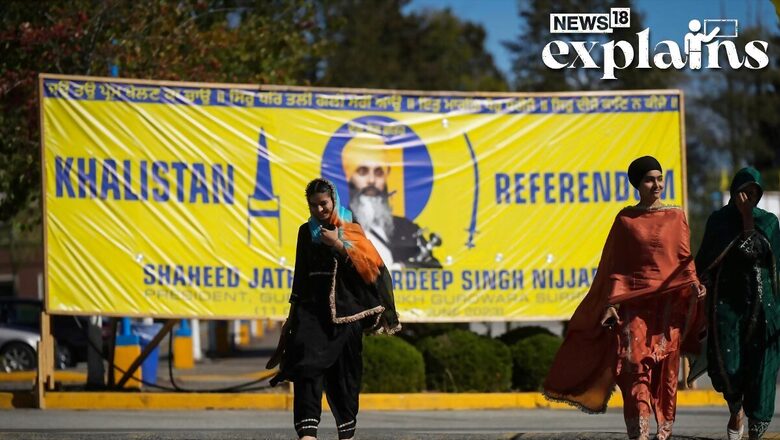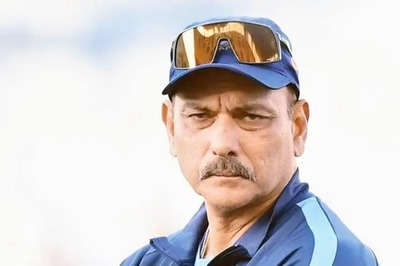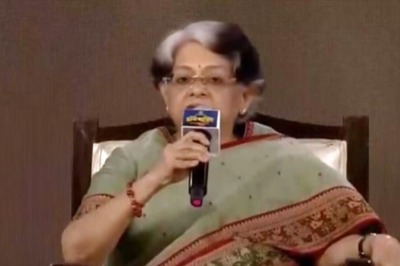
views
The bilateral ties between India and Canada have deteriorated after Canadian Prime Minister Justin Trudeau alleged “potential" Indian links to the killing of Khalistani separatist leader Hardeep Singh Nijjar and expelled an Indian diplomat over the issue.
India rejected Trudeau’s remarks as “absurd" and “motivated" and reacted strongly by saying that such “unsubstantiated" allegations seek to “shift the focus from Khalistani terrorists and extremists, who have been provided shelter in Canada and continue to threaten India’s sovereignty and territorial integrity."
India summoned Canadian High Commissioner Cameron MacKay at the MEA headquarters at South Bloc and he was asked to leave India within the next five days, as per sources.
The widening rift between the two countries comes amid India’s concerns over Canada harbouring pro-Khalistani groups who have been carrying out anti-India activities.
Let’s take a look at the growing anti-India activities in Canada and explore how the country began hosting pro-Khalistani groups.
Immigration to Canada
The immigration of Sikhs from Punjab to Canada started in the early 20th century. According to reports, the soldiers in the British Army passing through British Columbia were attracted by the fertile land.
In the 1970s, there was a significant Indian population, especially the Sikh groups in Canadian society. Canada currently has 1.6 million people of Indian origin and a Sikh population of more than 7,70,000 (about 2 per cent of the total population).
In the 1980s, when the Khalistan movement was gaining prominence in Punjab, many Sikhs sought refugee status in Canada citing political persecution. When the situation worsened around and after Operation Blue Star, there was an influx of Khalistanis into Canada.
Moreover, several pro-Khalistani groups including the Sikhs for Justice (SFJ) have tried radicalising Sikh youths, especially those born after the 1984 riots. Canada also proved a convenient point for Khalistani leaders to travel to Pakistan to meet and train with their handlers from Pakistan’s ISI, according to Hindustan Times.
The link was evident when an Air India plane flying from Montreal to London, was blown up by Khalistani terrorists on June 23, 1985.
Though the Khalistan movement died in India in the late 1990s, but it thrived in Canada, especially in some gurdwaras controlled by radicals.
Anti-India activities in Canada
There have been several incidents carried out by pro-Khalistani groups including attacks on Hindu temples, Indian missions and pro-Khalistan rallies in Canada.
In June, a video surfaced on social media showing a float depicting the assassination of former Prime Minister Indira Gandhi by her Sikh bodyguards. The tableau was part of a parade that was organised by some Khalistani elements in Brampton and led to an outrage in India.
It evoked a strong response from India with the External Affairs Minister S Jaishankar saying there was “a bigger issue involved".
Does it help Canada's 'Indo-Pacific strategy'? A float depicting murder of late Indian PM by her Sikh bodyguards being part of about 5 KM long parade in city of Brampton on June 4th. Jody Thomas may reflect on it! pic.twitter.com/rBFn7vMKyz— Balraj Deol (@BalrajDeol4) June 6, 2023
In July, India summoned the Canadian envoy and issued a demarche over the increasing activities by pro-Khalistani elements in Canada, days after posters featuring names of India’s senior diplomats serving in Canada featured in some posters in certain areas in that country.
Last year, in November, a pro-Khalistan organisation known as Sikhs for Justice (SFJ) held a so-called ‘Khalistan Referendum’ in Mississauga. SFJ had held a Khalistan referendum at a gurdwara in Canada’s British Columbia earlier this month while Canadian PM Justin Trudeau was in India for the G20 Summit.
The group has now called for another referendum in the town of Surrey in British Columbia in October. This so-called referendum comes despite India’s strong concerns about Canada on the anti-India activities in the country.
SFJ is an outlawed organisation in India and has also been linked to the rocket-propelled grenade (RPG) attack at Punjab Intelligence headquarters in Mohali in May 2022.
Attacks on Temples and Indian Mission
There have been a series of attacks on temples in Canada by pro-Khalistani groups in the last few months.
Last month, a Hindu temple was vandalised in the British Columbia province in Canada by extremist elements, with Khalistan referendum posters.
In April this year, BAPS Swaminarayan temple was vandalised with anti-India graffiti in Windsor in Canada’s Ontario.
Earlier in February, the Ram Mandir in Canada’s Mississauga was vandalised with anti-India graffiti. The Consulate General of India in Toronto condemned the defacing of the Mandir and requested Canadian authorities to investigate the incident and take prompt action against the perpetrators.
In January, a Hindu temple in Brampton was defaced with anti-India graffiti triggering outrage among the Indian community. The Consulate General of India in Toronto condemned the vandalism at the Gauri Shankar Mandir stating that the act has deeply hurt the sentiments of the Indian community in Canada.
Earlier this year, there were violent protests by Khalistan supporters who attacked the Indian High Commission in Ottawa and hurled grenades at the mission in March. The Indian agencies found that pro-Khalistan protesters were behind the attack on the high commission building.
Canada’s Response to Khalistani Activities
Canada has failed to take any concrete steps in checking anti-India activities in the country despite India expressing grave concerns.
During his India visit at the G20 Summit, Justin Trudeau at a press conference said his country will always defend freedom of peaceful protest but at the same time asserted that it will always prevent violence and push back against hatred.
“Canada will always defend freedom of expression, freedom of conscience, and freedom of peaceful protest and it is extremely important to us," he said.
“At the same time, we are always there to prevent violence and to push back against hatred. I think on the issue of the community, it is important to remember that the actions of the few do not represent the entire community or Canada," Trudeau said.




















Comments
0 comment